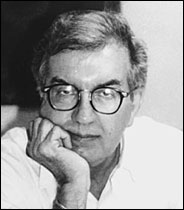Featured New Authors
The New York Times > Books > Sunday Book Review > Featured Author: Larry McMurtry

Larry McMurtry
| |
| | |
In This Feature
REVIEWS OF LARRY McMURTRY’S EARLIER BOOKS:
(1961)
“[McMurtry] is already well up among the most promising first novelists who have appeared this year. What’s more, his promise is the kind that lasts.”
(1963)
“‘Leaving Cheyenne’ is brightened and warmed by the author’s grasp of his setting and by his ear for the music of talk in Archer County.”
(1966)
“McMurtry is not exactly a virtuoso at the typewriter. . . . [S]ome of the writing could be smoother. But he knows his town and its folkways.”
(1970)
“McMurtry simply doesn’t know how to turn off his electric typewriter. Almost as though acknowledging the inability of Patsy, et al., to sustain so long a book, he shores it up with detail.”
(1972)
“McMurtry has the faults of a strong but careless writer like Mailer, but they are easily forgiven in this particular novel, which seems so thoroughly a type of ‘American’ classic without
any of the painless charm of housebroken literature.”
(1975)
“. . . it must be that Mr. McMurtry has something special going for him. He can write up a mess and still win you over with it.”
(1978)
“The trouble is that the characters keep kicking over the traces of the plots and themes. It’s just as well they do. It’s what makes them so appealing.”
(1982)
“The cruising is endless and serves only to connect the short, affectionate, sometimes hilarious vignettes of Americans trading and swapping that give the book its genuine eccentricity.”
(1983)
“McMurtry’s Las Vegas is seen through the weary, half-shut or in some cases blindfolded eyes of its heroine, Harmony, a showgirl.”
(1985)
“If there is a novel to be written about trail-driving that will be lasting and deep without being about brave men . . . it is still to be written. For now, for the Great Cowboy Novel, ‘Lonesome
Dove’ will do.”
(1987)
“‘Texasville’ aims to be farcical and uproarious. It is filled with local idiom, tall stories and unabashed one-liners, many of which fall flat or offend, but some of which are dead-on
funny.”
(1987)
“For writers with aspirations to grab off a little Hollywood gold while simultaneously pursuing literary careers, [these pieces] are invaluable. Mr. McMurtry has been there and he knows what he is
talking about.”
(1988)
“Is ‘Anything for Billy’ as good as ‘Lonesome Dove’? No. Few novels are. . . . But it doesn’t matter. When a writer is as good as Mr. McMurtry is, even a relatively minor
book is a major event.”
(1989)
“Mr. McMurtry’s prose stands up and kicks fence posts. His cowboys are articulate, his petty criminals have grand potential, and in his latest book, ‘Some Can Whistle,’ even a rich
novelist is as complex as Hamlet, and as doomed.”
(1990)
“[The] past does comes alive in Larry McMurtry’s ‘Buffalo Girls,’ a lovely, moving and very funny novel that is first and foremost a work of resurrection, a book that rescues an important
era of our country’s saga . . .”
(1992)
“The success of a book like this one depends on the tone the author manages to muster up. Mr. McMurtry’s is sentimentality laced with comic irony, and it works very well. I can’t believe
some of the things he gets away with.”
(1993)
“‘Streets of Laredo'” is by no means a complete failure. In one way at least it is the full equal of ‘Lonesome Dove.’ Larry McMurtry remains a genius at dialogue.”
(1994)
“In the hands of Mr. McMurtry and Ms. Ossana, Floyd comes out flatter than a Depression pancake in the meanest Okie truck stop. . . . What is a guy like Larry McMurtry doing on a thing like this?”
(1995)
“McMurtry’s two novels [‘Dead Man’s Walk’ and ‘Lonesome Dove’], freestanding and yet linked, should surely earn an award of some kind, for carrying forward to their
ultimate limit the themes and leather-tough atmospherics on which novels and films of the Texas frontier depend. Perhaps they should be called the Great Western.”
(1995)
“Mr. McMurtry’s career as a serious novelist is becoming checkered fast. Still you keep reading, because he has written novels good enough . . . to make you wonder why the rest are no better
than they are.”
(1997)
In defter hands, a novel like ‘Zeke and Ned’ could have taken the measure of clashing cultures, but Mr. McMurtry and Ms. Ossana . . . can’t seem to move their story beyond television mini-series
terrain.”
(1997)
“. . . a sprawling, picaresque novel that, like the history of the West itself, leaves more than a few loose ends.”
(1999)
“McMurtry evokes a period and a culture rather than one man . . . This is fine writing, and suggests once again that history and biography can best be restored by the creative imagination.”
(1999)
“McMurtry proves again that he is as clear-eyed a writer as anyone in the business. . . . A worthy end to an important trilogy, one that captures vividly and movingly nearly half a century of life
in a great swath of America.”
(1999)
“Tentative and poignant . . . It’s a peculiar effort — part memoir, part commonplace book, part tour de force . . . While he’s comfortable reconstructing his career as a reader, McMurtry
disappointingly heads himself off at some revealing personal passes . . . [It] often feels rushed and preoccupied.”
(2000)
“An occasion for fleeting, from-the-hip commentary on anything that comes to his eye or mind . . . A jumble of enigmatic glimpses at the Western past, present cultural gossip and now and then a literary
perception, offered at flash-card speed by an omnivorous reader.”
(2000)
“McMurtry is a master at celebrating the scruffy glory that was the American West even as he’s poking fun at it. . . . reads at times like a movie treatment: the author provides the setup, leaving
it to the movie people (or the imaginative reader) to fully inhabit this world . . .”
(2001)
“[In] McMurtry’s 29th book and third memoir, he travels to the South Pacific to think and write about his parents, particularly his dying mother. . . this slight book [is] at once sardonic,
wise and insightful . . .”
The Berrybender Narratives, Book 1‘
(2002)
“[T]he first volume of a planned tetralogy that follows the fate of an upper-crust British family’s attempt to explore the Western frontier by riverboat. . . . a wholly compelling portrait
of the brutal, elemental American wilderness.”
‘The Wandering Hill:
The Berrybender Narratives, Book 2‘
(2003)
“‘The Wandering Hill’ is full of rich incident and provocative people, but reading it by itself is like walking in on the middle of an unusually detailed, possibly wonderful shaggy
dog story and then leaving before the punch line is delivered.”
‘By Sorrow’s River:
The Berrybender Narratives, Book 3‘
(2003)
“By the end of this third volume, the Berrybenders, or what’s left of them, have staggered to the banks of the Rio Grande . . . [T]hat’s the problem with the latest installment
of these narratives . . . Too much hem and haw.”
‘Folly and Glory:
The Berrybender Narratives, Book 4‘
(2004)
“. . . a genre-bending Western farce that follows the misadventures and couplings of a sprawling English family and its hangers-on as it makes its roundabout way across the West in the
1830’s. . . . a somber and satisfying end to a long, rambunctious trip.”
A Texan Who Likes to Deflate The Legends of the Golden West
(1988)
“I’m a critic of the myth of the cowboy,” says McMurtry in this New York Times interview.
Larry McMurtry’s Dream Job
(1997)
A New York Times Magazine profile of the author.
Source link



